

How To Stop Repeating Yourself And Start Speaking With Power. Do you repeat yourself when giving directions?
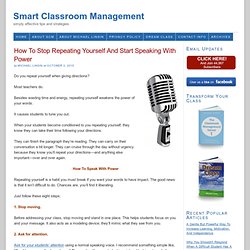
Most teachers do. Besides wasting time and energy, repeating yourself weakens the power of your words. How To Use ‘The Power Of One’ Strategy To Improve Behavior. You’re going to love this classroom management strategy.
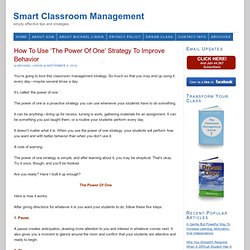
So much so that you may end up using it every day—maybe several times a day. It’s called ‘the power of one.’ The power of one is a proactive strategy you can use whenever your students have to do something. It can be anything—lining up for recess, turning in work, gathering materials for an assignment. How To Inspire Classroom Management Excellence. Imagine if your students were able to perform every classroom routine and every transition perfectly without you having to say a word.
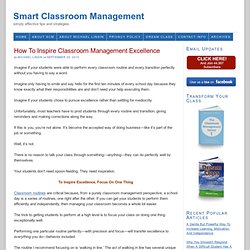
Imagine only having to smile and say hello for the first ten minutes of every school day because they know exactly what their responsibilities are and don’t need your help executing them. Imagine if your students chose to pursue excellence rather than settling for mediocrity. Unfortunately, most teachers have to prod students through every routine and transition, giving reminders and making corrections along the way. 7 Classroom Management Strategies To Get Your Class Back On Track. Maybe it’s the weather.
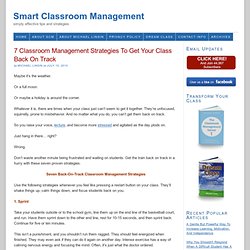
Or a full moon. Or maybe a holiday is around the corner. 12 Classroom Management Myths You Need To Know About. There are a number of popular notions about classroom management that are widely accepted as gospel.
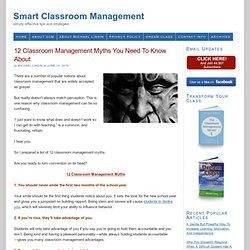
But reality doesn’t always match perception. A Classroom Management Strategy Every Teacher Should Use. What do you do when your students perform an everyday procedure, like entering the classroom, in a way that doesn’t meet your expectations?
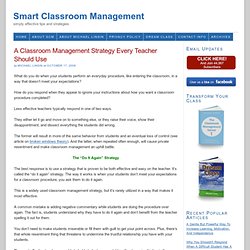
How do you respond when they appear to ignore your instructions about how you want a classroom procedure completed? Less effective teachers typically respond in one of two ways. They either let it go and move on to something else, or they raise their voice, show their disappointment, and dissect everything the students did wrong.
The former will result in more of the same behavior from students and an eventual loss of control (see article on broken windows theory). And the latter, when repeated often enough, will cause private resentment and make classroom management an uphill battle. The “Do It Again” Strategy The best response is to use a strategy that is proven to be both effective and easy on the teacher. How To Get Control Of Any Classroom. When confronted with a difficult class—whether a new class in the beginning of a school year, a class you’ve had for a while and lost control of, or one you see once a day in your subject area—the best thing you can do is slow things down to a glacial pace.
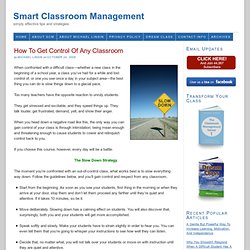
Too many teachers have the opposite reaction to unruly students. Why Freedom Is A Powerful Classroom Management Strategy. There is a common misconception that to be most effective at classroom management you have to be controlling.
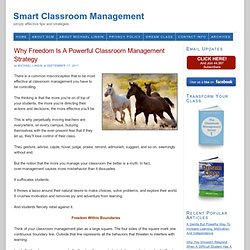
The thinking is that the more you’re on of top of your students, the more you’re directing their actions and decisions, the more effective you’ll be. This is why perpetually moving teachers are everywhere, on every campus, busying themselves with the ever-present fear that if they let up, they’ll lose control of their class. They gesture, advise, cajole, hover, judge, praise, remind, admonish, suggest, and so on, seemingly without end. But the notion that the more you manage your classroom the better is a myth. In fact, over-management causes more misbehavior than it dissuades. It suffocates students. It throws a lasso around their natural desire to make choices, solve problems, and explore their world.
Why The Word ‘Go’ Is An Effective Classroom Management Strategy. Do your students begin moving before you finish giving directions?
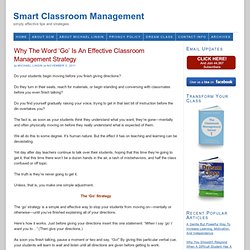
Do they turn in their seats, reach for materials, or begin standing and conversing with classmates before you even finish talking? Do you find yourself gradually raising your voice, trying to get in that last bit of instruction before the din overtakes you? The fact is, as soon as your students think they understand what you want, they’re gone—mentally and often physically moving on before they really understand what is expected of them. We all do this to some degree. It’s human nature. Yet day after day teachers continue to talk over their students, hoping that this time they’re going to get it, that this time there won’t be a dozen hands in the air, a rash of misbehaviors, and half the class confused or off topic. How To Use The Preview Strategy To Improve Behavior.
I think you’re going to like this strategy.
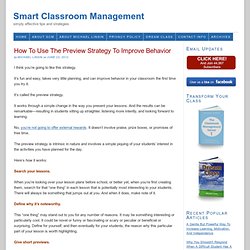
It’s fun and easy, takes very little planning, and can improve behavior in your classroom the first time you try it. It’s called the preview strategy. It works through a simple change in the way you present your lessons. And the results can be remarkable—resulting in students sitting up straighter, listening more intently, and looking forward to learning. How To Rid Your Classroom Of Student Interruptions. So you’ve got this great lesson. How To Teach Routines. 7 Keys To The First Day Of School. The first day of school is about setting the tone. It’s about focusing on the first wee little steps leading to the most memorable school year your students have ever had.
There is no room for weak first impressions, no room for indecisiveness, and no room to leave your students bored or uninspired. It’s best to think of the first day of school as a microcosm of the coming year. Why Accountability Is Key To Building Rapport. When students aren’t held accountable for misbehavior, they take advantage of it. They become brazen and disrespectful. They affect a cool, uncaring attitude. Handling Difficult Students The First Week Of School. Hoping to head misbehavior off before it starts, most teachers try to be proactive with difficult students.
Even before the bell rings on the first day of school, they peruse their new roster looking for those few whose reputation precedes them. They chat up previous teachers. They scrutinize student files. They nervously begin conjuring up creative ways of dealing with them—all before they even set foot in the classroom. And so when Anthony or Karla or whoever shows up for the first day of school, they can feel the bull’s-eye on their back.
They can feel labeled right out of the gate. And when students feel labeled, they’re pulled inexorably in its direction—fulfilling the prophecy it foretells. Why Intimidation Is A Terrible Classroom Management Strategy.